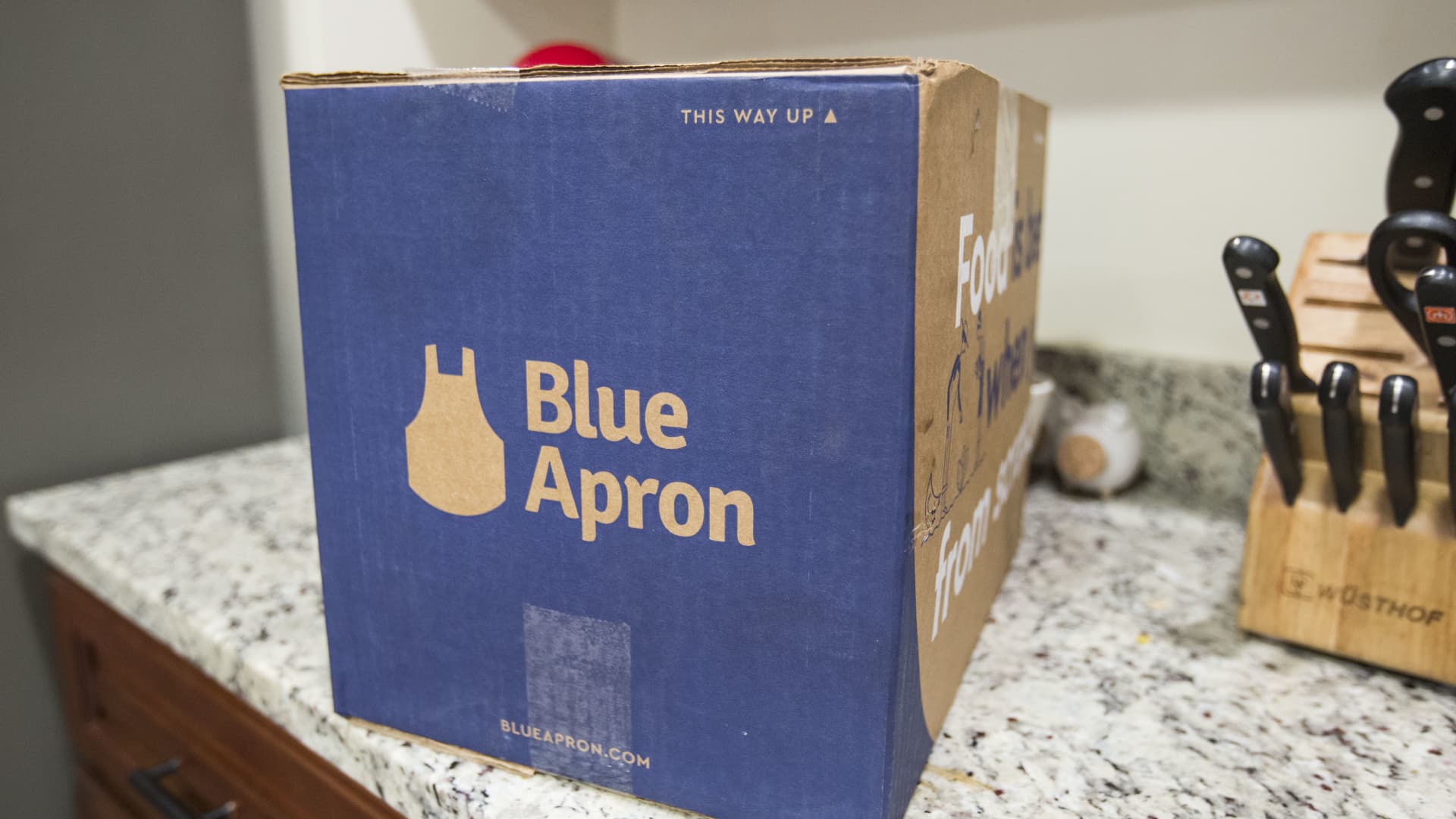Meal kit business Blue Apron announced Friday it has agreed to sell itself to food and restaurant company Wonder Group, founded by entrepreneur Marc Lore, for $103 million.
The deal, at $13 per share, represents a significant premium from Blue Apron’s per-share price at Thursday’s close of $5.49.
The sale caps years of ups and downs for Blue Apron, once a leader in at-home meal deliveries. In recent months, the company has transitioned to become a more asset-light business, selling its operational infrastructure to California-based meal provider FreshRealm for $50 million and laying off significant swaths of its workforce.
“The Blue Apron brand and products that our customers know and love will stay the same, with more opportunity for product expansion in the future,” Blue Apron CEO Linda Findley said in a statement Friday.
A checkered past
Blue Apron has long been mired in strategic difficulties since its mid-2010s heyday.
The company was founded in 2012, billing itself as an easier way to prepare home-cooked meals. Boxes arrived at the customer’s doorstep with pre-portioned ingredients and recipes to create their chosen dishes. The company specifically targeted working professionals in large cities who may have less time to grocery shop and cook.
In 2015, the company secured $135 million in funding from big name backers including Fidelity Investments at a valuation of $2 billion, the Wall Street Journal reported at the time. The company even turned a profit in the first two quarters of 2016, wowing potential investors ahead of an eventual IPO.
Blue Apron went public in June 2017 at $10 a share and a valuation of about $1.89 billion. The company initially forecasted a range of $15 to $17 per share, but lowered its projected per-share price following Amazon’s acquisition of Whole Foods Market, announced just weeks before the IPO.
Blue Apron stock gained little ground on its opening day.
By then, the tide had already begun to turn for the meal kit business. Blue Apron reported a loss of $52 million in the first quarter of 2017 on $245 million in revenue. That single quarter of losses rivaled the company’s full-year deficit from 2016 of $54.9 million.
Competition intensified for Blue Apron, as other meal kit businesses popped up on the scene like HelloFresh and Home Chef. Blue Apron still dominated 40.3% of the market, Verge reported at the time, but had lost 17% of its share since September 2016. HelloFresh trailed behind at 28% market share.
Shortly after the IPO, a number of shakeups took place within the company’s top executives. Co-founder and then-Chief Operating Officer Matthew Wadiak stepped down from his post less than a month after the IPO, and CEO Matt Salzberg was replaced by chief financial officer Brad Dickerson later that year, while Salzberg became executive chairman.
By the end of 2017, the situation looked bleak: The company said in its 2017 year-end report that it had lost 15% of its customer base year over year, citing decreased marketing spend. Net losses in 2017 amounted to $210 million.
By December of the following year, shares of Blue Apron had dipped below $1 per share, and the company was at risk of getting delisted from the New York Stock Exchange. Investors were reportedly spooked by Amazon’s acquisition of Whole Foods, high marketing expenses, and fulfillment center issues.
Rescue plan
In early 2020, reports surfaced that Blue Apron was considering going private.
Soon after, the company announced the closure of its Arlington, Texas, facility and the furlough of 240 employees as part of an effort to build “operational optimization and fiscal discipline to support our strategy and return to growth.”
CEO Linda Findley acknowledged during the company’s fourth quarter 2019 earnings call that the board was evaluating several strategic options to “maximize shareholder value.” Shares of Blue Apron traded for less than $4 apiece at the time, even after a reverse stock split to boost the per-share price.
But shortly thereafter, the Covid pandemic took hold and lockdowns kept people at home, breathing new life into the company. Blue Apron shares rallied from mid-March to mid-April 2020, jumping 400%.
But as the pandemic waned and demand for at-home meals slumped, Blue Apron sought out third-party partnerships to capture new customers. It began offering its meal kits on Walmart.com and opened up its preexisting Amazon partnership to include those without a Prime subscription.
Even so, the company continued to struggle, reporting a net loss of $109.7 million for 2022.
Enter, Wonder Group.
The company began making waves in May 2021, operating a fleet of faceless vans in Westfield, New Jersey. Wonder’s goal was to deliver fine dining options to residents of the New York City suburb. Vans were retrofitted as kitchens to cook and deliver the food to the customer.
The company partnered with restaurants to recreate their menu in an effort to save affluent suburbanites from having to go into the city to eat their favorite fine dining options.
By 2023, Wonder had abandoned the food truck concept, instead opting for a food hall restaurant concept that offers several menus within the same store. Similar to the food truck concept, Wonder has licensing deals with other well-known restaurants to prepare their foods in Wonder locations.
Last year, Wonder raised $350 million at a $3.5 billion valuation, according to the Wall Street Journal.
For now, Wonder has indicated that Blue Apron will operate more or less the same.
“Wonder plans to continue Blue Apron’s current operations serving customers nationwide under the Blue Apron brand, with expected new synergies between consumer-facing apps and delivery logistics,” Blue Apron said Friday.
“At home meals play a key role in this vision,” Wonder CEO Marc Lore said on Friday. “When the opportunity presented itself to unite with Blue Apron, pioneers in the meal kit industry, we knew it would accelerate our strategic position.”

